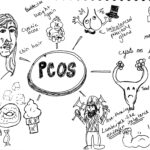I remember sitting in the walk-in clinic. I’d been waiting for over an hour, not to mention the time lost denying my symptoms, waiting until they got bad enough to warrant the visit in the first place. Finally, it was my turn. I walk into the treatment room, where a thin, middle-aged doctor was seated, her hair short and grey, her eyes encased in dark, baggy skin. She didn’t smile. “How can I help you?” She asked, bored already. I began where I thought the story began, at the beginning. I got a few sentences out before she cut me off. I was surprised; couldn’t she see that all this information was relevant? I didn’t just have fatigue, it was a part of me. It was woven into the fabric of my life; it had a back-story. This doctor needed to know when it began, what my life was like at the time, what I’d tried to do to treat it myself, when it felt better, when it felt worse. I didn’t believe she could treat me without that information. Surely it all mattered.
It didn’t matter to her. I realized at that moment that in her eyes I’d become something less-than-human: a mere symptom. I was just fatigue and fatigue just equalled a series of blood tests. Nothing else about me was relevant. When I left the visit I cried for all the power I’d felt evaporate from me during that visit. I felt hopeless. I hadn’t yet begun my career in healthcare and yet, as a patient I intuitively knew I wouldn’t feel better until I had someone listen to me.
Maybe you’ve had a similar experience. Maybe you simply know what naturopathic medicine is and are looking for a second opinion. Perhaps you would like treatment from a specific modality – dietary advice or acupuncture, for instance. Whatever the reason for booking an appointment with a naturopathic doctor, there are some things you might want to bring with you to prepare for your first appointment.
Bring patience: Know that healing, real healing, takes time. Naturopathic medicine, unfortunately, is not a one-visit kind of model. In the first visit we take a thorough patient history – asking detailed questions about your health and your past medical history. First visits can take 1 – 1.5 hours. From there, it can take a naturopathic doctor 1-2 visits before delivering a treatment plan and it can take weeks to months before seeing significant improvements. This doesn’t mean that things aren’t working, it just means that, in the same way it took a while for the symptoms to develop, it takes time to get back to a state of health. For those of you who are used to the listen-for-5-seconds-before-interrupting model, this might seem foreign.
Bring commitment: Healing requires some action on your end. Whether it means taking your supplements every day, being open to changing diet and lifestyle, or committing to a treatment protocol, healing requires some work on behalf of the patient. Naturopathic doctors seek to empower and, with great power comes some responsibility. We want to take the strings of your health out of the hands of puppet masters with white coats and stethoscopes and hand them over to you. You have the power to do more for your own health than any doctor, drug or piece of medical equipment. You might just need someone to show you.
Bring awareness: It’s important to pay attention to your symptoms. This might mean keeping a headache diary for a week or two to see if there is a connection to stress or the food you eat. It might mean bringing along some verbs and adjectives to describe the pain you feel in your back – does it radiate, is it sharp, is it dull? Does it throb? etc. No two people and no two diseases are alike. Therefore, it is useful for your naturopathic doctor to know everything about you and your condition that makes you unique so that he or she can tailor their treatment plan to you, not the name of your disease.
Bring any supplements, medications and past blood work to you visit: Coming to see a naturopathic doctor is similar in some ways to seeing your family physician. We work with conventional medical diagnoses and it’s very important for us to have your complete health history, including what supplements and medications you’re taking (including doses and brands) and, if you have it, recent blood work so that we can see what’s going on inside your body as well.
Bring your questions: Be prepared to make decisions about your health. Naturopathic doctors try to put the power back into your hands. Rather than telling you what to do, we like to give you information so that you are better able to make a decision about what you think is right for you. This means learning about your disease, paying attention to your body and symptoms, making lifestyle changes or taking treatment as prescribed. One of our principles of naturopathic medicine is docere, or “doctor as teacher.” This means our job is to teach you about your body. Knowledge is power and we’re invested in empowering you with your health and well-being.
Bring openness to change: Many people assume that seeing a naturopathic doctor will involve going home with a list of foods that they can no longer eat. However, this is rarely the case. We move at a pace that is right for you, encouraging you and empowering you to make small, relevant changes towards a healthier way of life and feeling better. However, getting better involves change. It involves being willing to let go of your symptoms, evolve your understanding of health and change the way you feel mentally and physically. Chances are you sought out a naturopathic doctor because you realized that you need to change; you want your health to change for the better. And, congratulations, because booking your first appointment is your first step towards that change.








